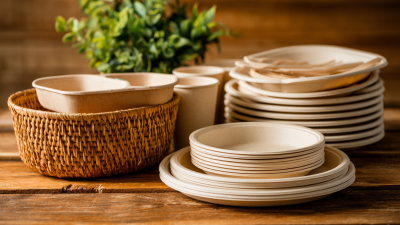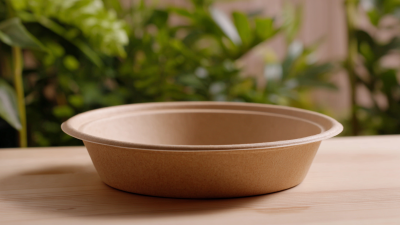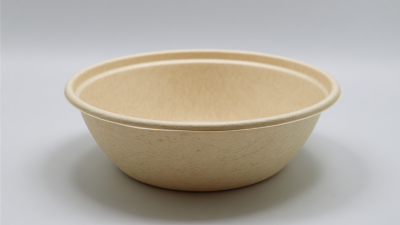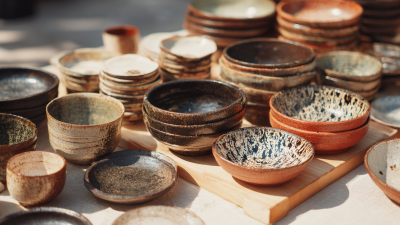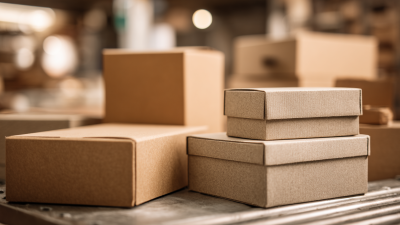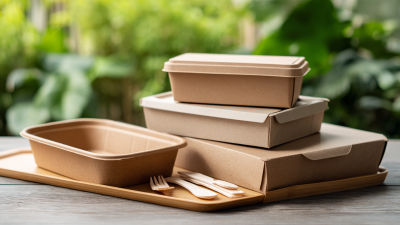In recent years, the demand for eco-friendly solutions in the food service industry has surged, driven by growing consumer awareness regarding environmental issues. According to a report by Grand View Research, the global biodegradable plates market is expected to reach USD 2.10 billion by 2025, underscoring a significant shift towards sustainable practices. A crucial element of this trend is the use of Compostable Crockery, which offers a viable alternative to traditional single-use plastics that contribute to pollution and landfill waste.
 With new regulations and the increasing push for zero-waste initiatives, businesses are now looking at sourcing sustainable options not only to meet consumer expectations but also to adhere to environmental standards. This ultimate guide aims to provide solutions for businesses seeking effective methods to source compostable crockery, ensuring a positive impact on both the planet and their bottom line.
With new regulations and the increasing push for zero-waste initiatives, businesses are now looking at sourcing sustainable options not only to meet consumer expectations but also to adhere to environmental standards. This ultimate guide aims to provide solutions for businesses seeking effective methods to source compostable crockery, ensuring a positive impact on both the planet and their bottom line.
 Compostable crockery has gained significant attention as businesses strive for eco-friendliness. According to the Biodegradable Products Institute, the global market for biodegradable foodservice packaging is projected to reach $17.4 billion by 2027, driven by increasing environmental awareness. Compostable plates, cups, and cutlery not only reduce waste but also contribute positively to a brand’s image. By opting for compostable options, businesses can significantly decrease their carbon footprint and appeal to a growing customer base that prioritizes sustainability.
Compostable crockery has gained significant attention as businesses strive for eco-friendliness. According to the Biodegradable Products Institute, the global market for biodegradable foodservice packaging is projected to reach $17.4 billion by 2027, driven by increasing environmental awareness. Compostable plates, cups, and cutlery not only reduce waste but also contribute positively to a brand’s image. By opting for compostable options, businesses can significantly decrease their carbon footprint and appeal to a growing customer base that prioritizes sustainability.
Tip: When sourcing compostable crockery, look for certification labels that indicate compliance with industry standards like ASTM D6400 or EN 13432. These certifications ensure that the products will break down in a composting environment, contributing to soil health rather than landfills.
In addition to environmental benefits, using compostable crockery can result in cost savings. A 2021 study by the Food Waste Reduction Alliance found that composting can reduce disposal costs by 30% compared to traditional waste management methods. Integrating compostable options into your business model not only enhances sustainability efforts but can also optimize operational costs, ultimately fostering a green business ethos.
Tip: Consider partnering with local composting facilities to streamline waste management and enhance your brand's commitment to sustainability. This collaboration not only benefits the environment but also builds community rapport.
As the demand for sustainable solutions rises globally, selecting the right suppliers for compostable tableware has become a crucial business decision. The bioplastic utensils market is experiencing significant growth, projected to reach over $140 billion by 2023, with an anticipated compound annual growth rate (CAGR) of around 5% through 2032. This growth is fueled by increasing environmental awareness and a collective effort to replace single-use plastics with environmentally friendly options, such as bioplastics made from PLA, CPLA, and other compostable materials.
When choosing suppliers for compostable crockery, businesses should consider key factors such as material quality, supplier certifications, and the scalability of production. The eco-friendly disposable tableware market is expected to expand substantially, with estimates indicating a market size of approximately $495.5 billion in 2025 and surpassing $1 trillion by 2033, reflecting a robust growth rate of 9.36%. This trend illustrates the strong consumer preference for green alternatives, highlighting the importance of partnering with suppliers who can meet these rising demands while maintaining quality and sustainability standards.
| Criteria | Description | Importance |
|---|---|---|
| Material Source | Assess whether materials are from renewable resources | High |
| Certification | Check for certifications such as BPI, ASTM, or EN13432 | Critical |
| Production Practices | Evaluate eco-friendly production processes | Moderate |
| Biodegradability | Confirm that products break down safely without harmful residues | High |
| Cost | Compare pricing among suppliers for budget-friendly options | Moderate |
| Sustainability Impact | Estimate the overall environmental impact of sourcing decisions | High |
| Supplier Reputation | Research the supplier's history and customer reviews | Important |
When considering sustainable compostable crockery for your business, it’s essential to compare the popular materials used, as each has its own unique set of advantages and disadvantages. One common option is PLA (polylactic acid), derived from cornstarch. PLA crockery is biodegradable under industrial composting conditions, making it an environmentally friendly choice. However, it has limited heat resistance, which can be a drawback for hot foods and liquids.
Another popular material is bagasse, a byproduct of sugarcane processing. Bagasse plates and bowls are sturdy, compostable, and can handle hot and oily foods without losing integrity. Nevertheless, they may not be as readily available or might come at a higher price point compared to other options. Additionally, there are palm leaf dishes, which offer a rustic aesthetic and are entirely biodegradable. The downside is their limited availability and potential variability in quality, depending on the sourcing practices of suppliers. By evaluating these materials carefully, businesses can make informed choices that align with their sustainability goals.
When evaluating the cost-effectiveness of compostable crockery versus traditional plastic or paper options, it is crucial to consider the long-term benefits alongside immediate expenses. While the initial purchase price of compostable products may be higher, businesses often overlook the potential savings related to waste disposal and environmental impact. Compostable items contribute to a circular economy, reducing landfill costs and the carbon footprint of waste management. Additionally, many regions are introducing stricter regulations on single-use plastics, which could lead to increased costs for traditional products over time.

Furthermore, customer perception plays a vital role in a business's overall success. Today's consumers are increasingly conscious of sustainability practices and may be more inclined to support businesses that prioritize eco-friendly options. Investing in compostable crockery can enhance brand image, fostering loyalty and potentially driving higher sales. Ultimately, the cost-effectiveness of sourcing compostable crockery goes beyond just the price tag; it encompasses environmental responsibility and the evolving preferences of environmentally conscious consumers.
When sourcing sustainable compostable crockery for your business, understanding sustainability certifications is crucial. These certifications assure that the products you choose meet specific environmental standards and perform well in composting scenarios. The most recognized certifications include ASTM D6400, EN 13432, and BPI Certification. Look for products with these labels to ensure they break down effectively in commercial composting facilities, contributing positively to waste reduction.
Tip: Always request documentation of certification from your suppliers. This ensures that the products are not only labeled as compostable but are also proven to meet stringent environmental criteria. Additionally, familiarize yourself with the local composting regulations, as this will guide you in selecting tableware that aligns with local waste management practices.
Another key aspect is to verify the sourcing of the raw materials. Certifications like FSC (Forest Stewardship Council) and Fair Trade can add a layer of credibility to your products, indicating responsible sourcing practices. Ensure your suppliers adhere to ethical standards in both manufacturing and sourcing to reinforce your commitment to sustainability.
Tip: Building relationships with suppliers who prioritize transparency can also lead to better options and support for sustainable practices across your supply chain. This not only enhances your brand's reputation but also attracts eco-conscious customers.
